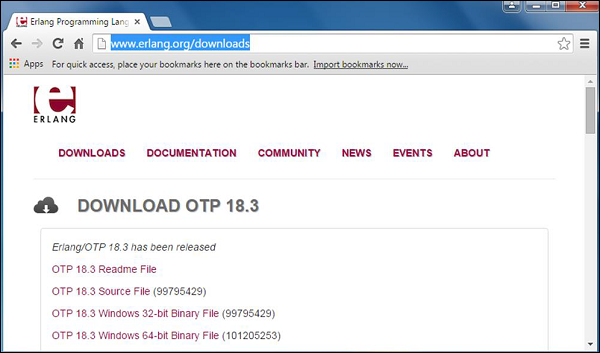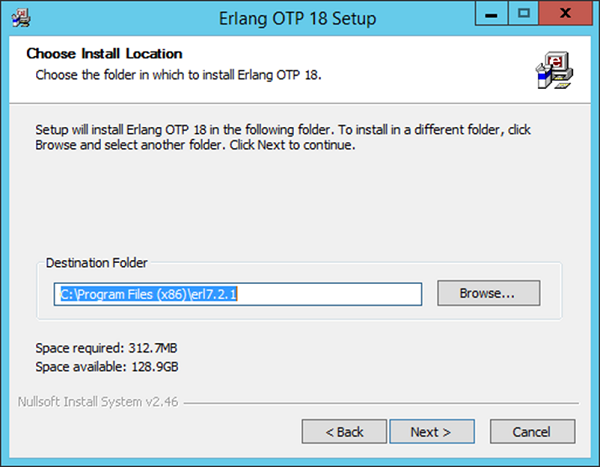The latest release of RabbitMQ is 3.8.9. See change log for release notes.See RabbitMQ support timeline to find out what release series are supported.
CNET Download provides free downloads for Windows, Mac, iOS and Android devices across all categories of software and apps, including security, utilities, games, video and browsers. Download injixo Erlang and enjoy it on your iPhone, iPad, and iPod touch. Welcome to injixo Erlang, the ErlangC staffing calculator from injixo. Do you need to quickly calculate the required staffing in your contact centre, given a call volume, AHT and service level goal?
Experimenting with RabbitMQ on your workstation? Try the community Docker image:
RabbitMQ Server
Installation Guides
Download Erlang Windows
- Linux, BSD, UNIX: Debian, Ubuntu | RHEL, CentOS, Fedora | Generic binary build | Solaris
- Windows: Chocolatey or Installer (recommended) | Binary build
- MacOS: Homebrew | Generic binary build
Kubernetes
- Open source RabbitMQ Cluster Kubernetes Operator by VMware (developed on GitHub)
- A peer discovery mechanism for Kubernetes
- GKE-, Minikube-, or Kind-based examples that demonstrate a DIY RabbitMQ on Kubernetes deployment
Docker
- Docker community-maintained RabbitMQ Docker image (on GitHub)
Downloads on GitHub
- RHEL/CentOS 8.x |RHEL/CentOS 7.x |RHEL/CentOS 6.x |OpenSUSE |SLES 11.x |Erlang RPM
Debian (Apt) and RPM (Yum) Repositories
- Bintray (Apt)
- Bintray (Yum)
Cloud
- RabbitMQ Cluster Kubernetes Operator by VMware (developed on GitHub)
- CloudAMQP: RabbitMQ-as-a-Service available in multiple clouds
Provisioning Tools (Chef, Puppet, etc)
Release Signing Key
- Release Signing Key0x6B73A36E6026DFCA (on GitHub)
- Release Signing Key (alternative download location on rabbitmq.com)
- Release Signing Key (alternative download location on Bintray)
Downloads on Bintray
Bintray is an alternative download location that provides a subset of packages compared to GitHub.
- Debian, Ubuntu |Erlang Debian packages
- RHEL/CentOS 8.x and 7.x |RHEL/CentOS 6.x |OpenSUSE |SLES 11.x |Erlang RPM packages
Older Versions
- 3.5.x |
Client Libraries
Java Client
- On Maven Central: RabbitMQ Java client
- Quick download: Maven.org |Source
- API reference (JavaDoc)
JMS Client
- On Maven Central: RabbitMQ JMS Client
.NET/C# Client
- On NuGet: RabbitMQ .NET Client
Erlang Client
- Quick download: Binary client.ez, common.ez |Source .tar.xz
Clients for Other Languages
The RabbitMQ community has created a large number of clients and developer toolscovering a variety of platforms and languages.
Community Plugins
For your convenience, we offer binary downloads of variousplugins developed by the community.
Snapshot (Alpha) Builds
Snapshot releases of the RabbitMQ brokeravailable to users who wish to experiment with the latest andgreatest features and bug fixes. For more details, head over tothe snapshots page.
Getting Help and Providing Feedback
If you have questions about the contents of this guide orany other topic related to RabbitMQ, don't hesitate to ask themon the RabbitMQ mailing list.
Help Us Improve the Docs <3
If you'd like to contribute an improvement to the site,its source is available on GitHub.Simply fork the repository and submit a pull request. Thank you!
Erlang is a great language that lets you build highly concurrent applications. This tutorial will teach you how to quickly get started with it.

Preliminary steps
Installing Erlang OTP
The first thing for setting up an Erlang environment is installing Erlang OTP, a set of Erlang libraries essential for development.
Windows
If you are a Windows user, download the Erlang OTP package and run the installation wizard. Once the installation is over, add the installation path plus bin to the PATH environment variable.
macOS
If you are an macOS user, to install Erlang OTP, type the following at the Terminal prompt (make sure you have Homebrew installed on your machine):
If you prefer MacPorts to Homebrew, your command line should be different:
Linux
The installation process for Linux is similar to macOS, except that instead of brew or port you have to use apt-get (a Linux package management utility):
You can always download the latest version of Erlang OTP package for any OS.
Verifying Erlang OTP installation
To verify that Erlang OTP is installed correctly, run the Erlang shell by typing erl in a Terminal prompt:
To learn more about the Erlang shell, read its user guide.
Installing Rebar
In addition to Erlang OTP, you’ll also need Rebar, a build tool that helps compile and test Erlang applications. The easiest way to install it on your machine is to download its sources and build it locally:
Congratulations! You now have a self-contained script called 'rebar' in your current working directory. Place this script anywhere in your path and you can use rebar to build OTP-compliant apps.
Setting up IntelliJ IDEA
Now when Erlang OTP and Rebar are set up, it’s time to download and install IntelliJ IDEA. Keep in mind, that for Erlang development you can use IntelliJ IDEA Community Edition (which is free and open-source).
Once the IDE is up and you see its Welcome screen, go to Configure | Plugins, then click Browse repositories, locate the Erlang plugin and install it:
After installing the plugin, restart IntelliJ IDEA.
Configuring an Erlang SDK
One more thing you’ll have to do to configure IntelliJ IDEA is to add an Erlang SDK.
To do that, change the structure of the default project. Open the default project structure in one of the two ways:
On the Welcome screen, go to Configure | Project Defaults | Project Structure
On the main menu, choose File | New Projects Settings | Structure for New Projects
Then, add an Erlang SDK by specifying the path to the Erlang OTP installation directory.

If you don’t know where Erlang OTP was installed, check the following directories:
Windows: C:Program Fileserl<version>
Linux: /usr/lib/erlang/<version>
MacPorts, macOS: /opt/local/lib/erlang/<version>
Homebrew, macOS: /usr/local/Cellar/erlang/<version>
Configuring Rebar
The final adjustment you have to do is to specify the path to Rebar, so that IntelliJ IDEA can run Rebar commands from the IDE.
You can do it via Configure | Preferences | Other Settings → Erlang External Tools:
Creating a new project
Creating an Erlang project
There are several ways to create a new Erlang project. The easiest one is to use the Create a new project from the Welcome screen.
Click Create New Project:
Then choose Erlang in the left pane, and click Next.
IntelliJ IDEA prompts you to choose an Erlang SDK (which you've already configured):
After that you’ll be asked to specify the name of your project and its directory. The following image shows the resulting Erlang project with the name ErlangDemo:
Creating a Rebar project
Instead of a pure Erlang project, you might want to create a Rebar project. To do that, type the following code at the Terminal prompt:
Once the project has been created, import it into IntelliJ IDEA to make it possible to open this project in the IDE.
Importing a project into IntelliJ IDEA
You can import a project into IntelliJ IDEA in several ways. Let's explore importing from the Welcome screen.
On the Welcome screen, press Ctrl+Shift+A, type project from existing sources, and click the Import project from existing sources action in the popup.
In the dialog that opens, select the directory in which your sources, libraries, and other assets are located and click Open.
IntelliJ IDEA offers you to either import the project from existing sources, or from an external model (a build file).
If your project uses Rebar, select the corresponding option when asked.
Erlang Download Mac App
When importing a Rebar project, make sure to enable the option Fetch dependencies with rebar:
Running and debugging an application
To run an application, you have to create a run/debug configuration created against the stub Erlang Application. To do this, on the main menu choose Run | Edit Configurations, select the stub Erlang Application, specify the name (here it is hello.hello_world), and specify the application’s module and function:
After that you’ll be able to run your application via the main menu (Run | Run <run configuration name>, the toolbar , or a even a shortcut Ctrl+Shift+F10.
Once you have a run/debug configuration, you can also debug your application via the main menu (Run | Debug ‘<run configuration name>, the toolbar , or a shortcut Shift+F9:
For more information, refer to the concept of a run/debug configuration and the procedural sections Run applications and Debug code.
Running Eunit tests
Running Eunit tests is similar to running an application, but needs a different run/debug configuration, created against the stub Erlang Eunit:

IntelliJ IDEA provides a handy Test Runner with support for Eunit. It shows test results, lets you rerun tests of you choice, jump to failed tests, etc.:
Running Rebar commands
Running Rebar commands is also possible right from the IDE – with the help of the Erlang Rebar run/debug configuration:
Note that if your Rebar commands run tests, you can use a Erlang Rebar Eunit run/debug configuration to see test results in a Test Runner.
Additional
Learning Erlang
To learn Erlang, we recommend that you start by reading the official Erlang user guide, and of course the Learn You Some Erlang for Great Good tutorial by Fred Hebert.
Learning IntelliJ IDEA
IntelliJ IDEA is a Java IDE in the first place, however it’s also a platform and IDE for other languages, such as Erlang, Python, Ruby, PHP, and many other. To learn more about IntelliJ IDEA, it’s worth checking out the section IntelliJ IDEA overview and watch the Video Tutorials.
If you have a question, you can always ask it on StackOverflow (probably it’s already answered).
Providing Feedback
Erlang Download Mirror
In case you’d like to share your feedback about IntelliJ IDEA or its support for Erlang, feel free to submit an issue in Erlang plugin GitHub repository, or to the IntelliJ IDEA issue tracker.
For information about contacting JetBrains support, see Getting started.
Erlang Rpm Download

Comments are closed.